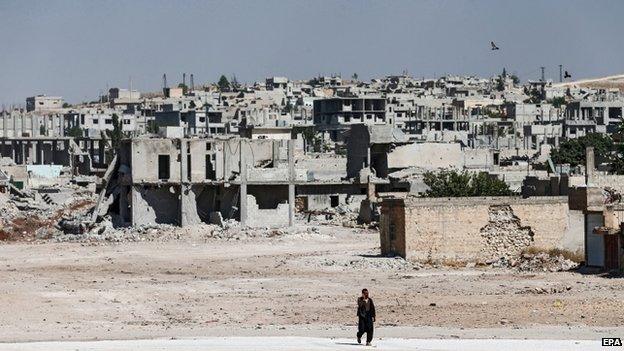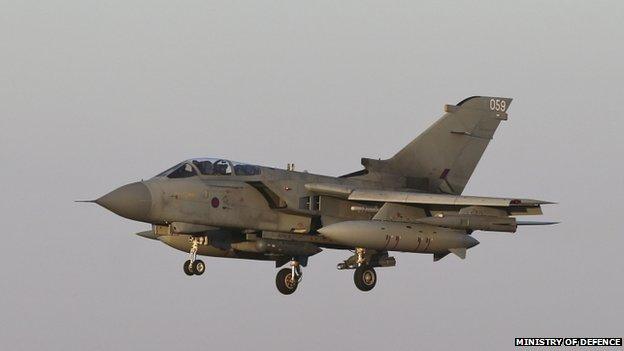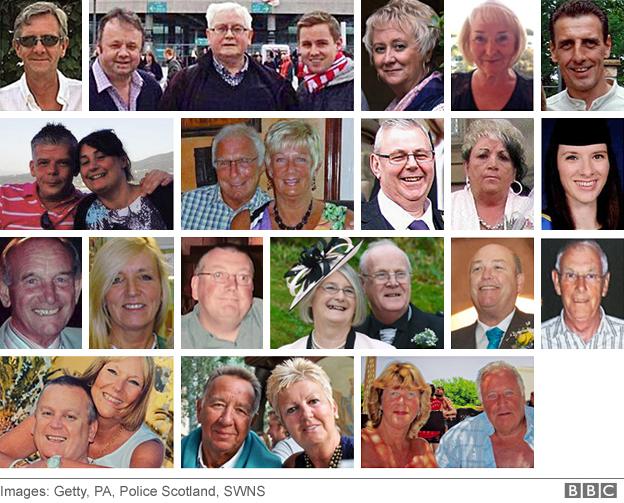What difference could Syria IS air strikes make?
- Published

Kobane, on the border of Syria and Turkey, has been the scene of repeated IS attacks
Britain's potential involvement in the air campaign against so-called Islamic State targets in Syria now looks to be squarely back on the agenda.
Defence Secretary Michael Fallon is preparing the ground and the government clearly believes that the context, in the wake of the deadly attack against tourists in Tunisia is sufficiently different to secure parliamentary backing for such a move.
In 2013, the issue was whether to mount attacks against targets associated with the regime of Syrian president Bashar al-Assad.
Now the goal would be very different; to join in the air campaign that is already being waged against Islamic State (IS) militants by US warplanes along with those of a number of its Arab allies.
So far, Canada is the only other Nato country apart from the US to join this part of the air campaign.
Flying every day
Like Britain, most Western countries have felt more comfortable restricting their air attacks to targets in Iraq.
Nonetheless, Britain has been carrying out intelligence-gathering flights over Syria with a variety of aircraft.
So what would be the significance of Britain extending its operations to Syria and what difference might it make?

In practical terms, Britain's air operations over Iraq involve eight Tornado warplanes flying out of Cyprus and a small number of Reaper unmanned aerial vehicles from Kuwait.
British aircraft are in the air pretty well every day though actual attacks are sporadic.
Weapons may be dropped for three or four days in a row, then there may be a couple of days' gap when, for whatever reason, either no suitable targets are found or essential maintenance is being conducted, no weapons are released.
'No dramatic increase'
British air assets are also of vital importance for reconnaissance, its aircraft being equipped with highly sophisticated electronics to gather a picture of what is happening on the ground.
In purely military terms then, an expansion of RAF operations to Syria would add some useful capability, but would not signal a dramatic change in the tempo of attacks.
The Canadian Air Force has found target acquisition quite difficult in Syria given that there are no "allied" forces on the ground performing the same role as the Iraqi military.

A Tornado returning from Operation Shader duties in Iraq
Might Britain need to find more resources for an expanded air operation? The Tornados are capable but old airframes.
More aircraft would certainly add to the cost of the operation with more munitions expended and so on.
And of course there is no indication of any end to this air campaign.
Sending a message
However, at the political level the significance of a British decision to expand operations to Syria would be significant.
For one thing, it would send a positive signal to Washington where, in some quarters, Britain has - rightly or wrongly - been seen as a somewhat less reliable ally than in the past.
A British decision to bring Iraq and Syria into the same air campaign would also serve to highlight once again that any strategy against IS must encompass both countries.

Thirty of the 38 victims of the Tunisia attack were British
Indeed IS has in effect removed the significance of the border between them.
This fact has somewhat been lost over recent months as the US-led strategy in Iraq has floundered and the crisis in Syria has simply continued with IS making significant headway.
For Britain itself, any decision to expand operations to Syria may still be some way away and will require parliamentary endorsement.
It would be a way for Prime Minister David Cameron's government to very publicly expand the campaign against IS as a response to the Tunisia attacks.
Iraq and Syria remain the central battlefield in this struggle.
But as the events in Tunisia, the Sinai and elsewhere show, the example of IS is encouraging a variety of Islamist extremists - both individuals and groups - to rally to its banner, underlining the importance of developing a credible strategy to contain and defeat IS in its Iraqi and Syrian heartland.